September 12, 2025. – European Lecture Tour (5) Berlin
Hello. Today marks the fifth lecture of Venerable Pomnyun Sunim’s European tour, taking place in Berlin, Germany.
After completing his morning practice and meditation, Sunim expressed his gratitude to Ms. Choi Soon-jin for providing accommodation, and to Ms. Oh Jung-mi and Ms. Park Nam-sook for preparing the meal.
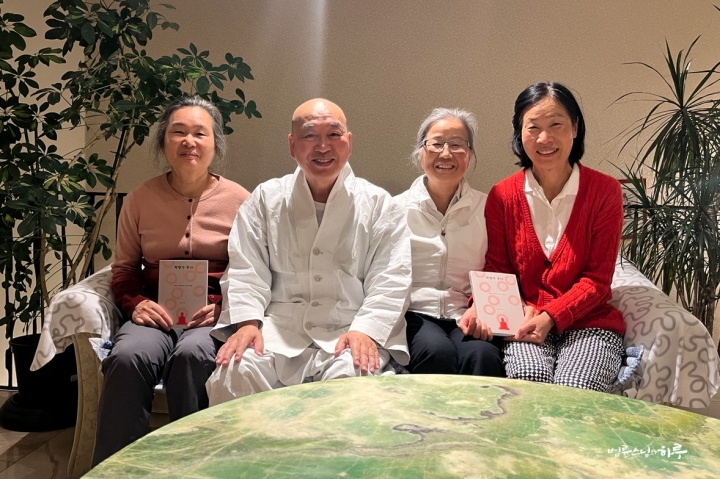
After exchanging greetings, they departed for Duisburg train station at 4:20 AM.
“Sunim, have a safe and healthy journey.”
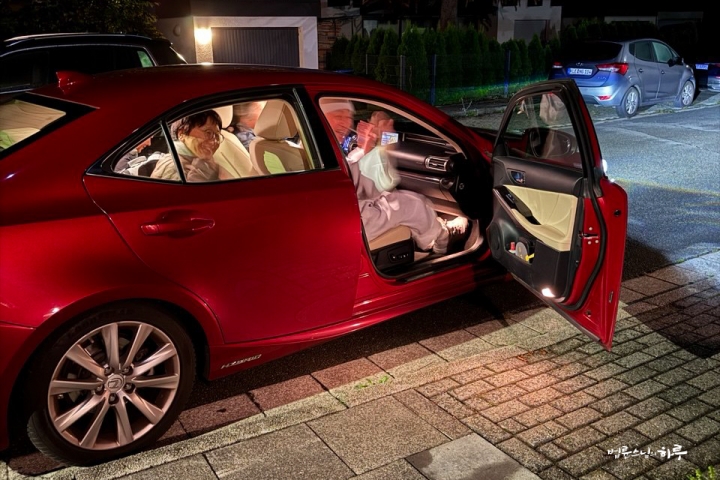

After completing the ticketing, at 5:02 AM, they boarded the German ICE (InterCity Express) high-speed train bound for Berlin. As the train traveled, the sun gradually rose outside the window.
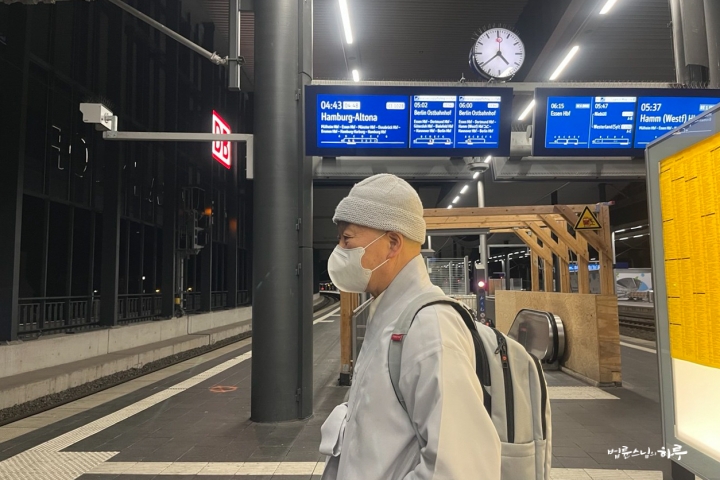
The train traveled for about four hours toward the capital Berlin, passing through major cities of former West Germany such as Gütersloh, Bielefeld, Minden, and Hannover.
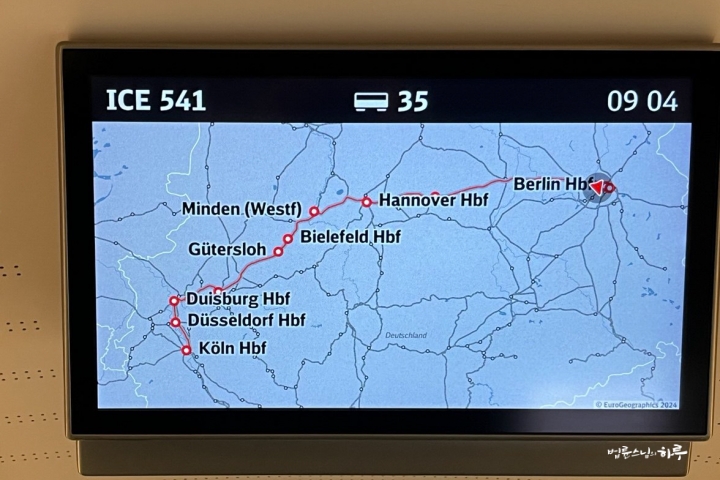
There had been concerns as German trains have frequently been delayed since the railway company was privatized, but fortunately, today the train arrived at Berlin Central Station on time at 9:18 AM. With no disruption to the scheduled itinerary, the accompanying practice team felt relieved as they exited the station. Mr. and Mrs. Sung So-hyun came to greet Sunim and his group.
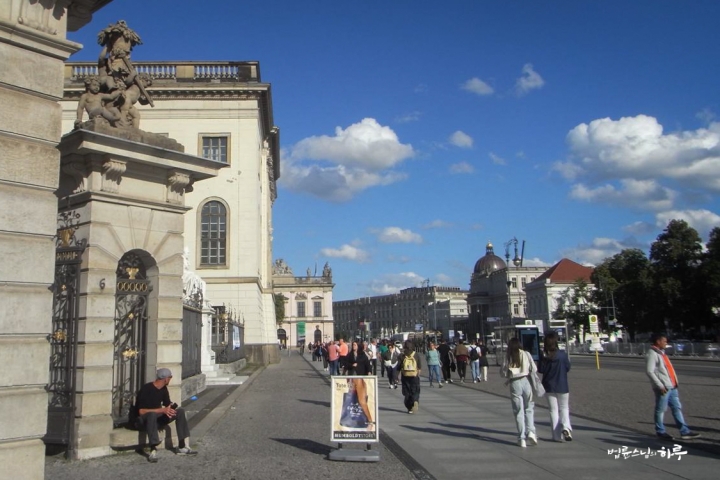
After loading the luggage into the car and moving to the accommodation, they had lunch together. After the meal, the Friday Dharma Q&A live broadcast began at 12:30 PM. Sunim connected to the live broadcast at 7:30 PM Korean time.
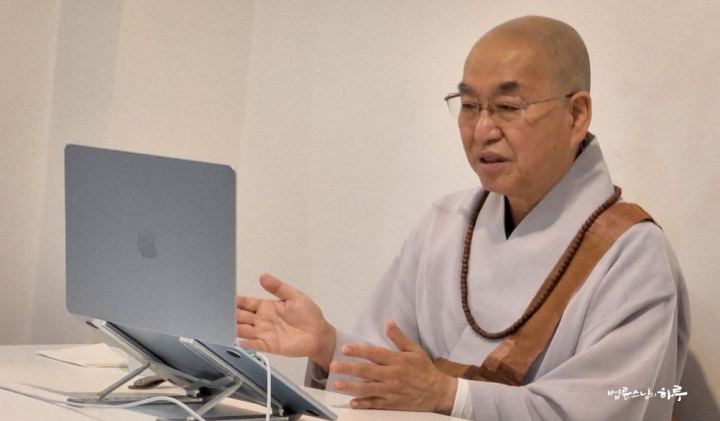
With about 3,900 people connected to the YouTube live stream, Sunim smiled and gave his greeting.
“I am currently in Berlin, Germany. In Berlin, there is the Free University in the former West Berlin area and Humboldt University in the East Berlin area. Until now, I have mainly given lectures at the Free University in West Berlin, but this time I chose Humboldt University in East Berlin as the venue. So the place where I’m staying is also in the former East Berlin area. Since East Berlin was relatively less developed in the past, it has recently transformed like a new city with many new buildings.”
How to Live Each Day Amid Chaotic International Affairs
I took a train at 5 AM this morning and arrived in Berlin. In the past, when things were constantly delayed, people would say ‘Korean time,’ and German people were known for being precise about everything. But when I came here, I heard that German trains are also frequently delayed these days. So there were many stories about how it’s difficult to keep to schedule when taking trains, but since it was a long distance of 600km, I chose the train, and fortunately, it arrived on time today. The local Jungto Society members called it a ‘miracle.’ That’s how often trains are delayed or completely canceled these days.
Europe is not the Europe of the past. In the UK, due to a subway strike, it took three hours to get from the airport to the lecture venue. In France, the prime minister received a vote of no confidence, and there are fires and chaos throughout the city due to strikes and protests. So I thought train operations would be difficult, but fortunately, only the train I took was running. When coming from the Netherlands to Germany, we used a car, and when coming from Düsseldorf to Berlin, there were concerns about keeping to schedule because trains are often late, but we arrived safely.
The reason I’m telling you this is to point out that the whole world is in great turmoil right now. Recently in Indonesia, a lecture was canceled due to protests, and in Nepal, the government changed due to protests. A lecture is scheduled soon in Istanbul, but it’s still uncertain whether it will proceed depending on local conditions. Protests are continuing everywhere, with courts issuing dissolution orders against opposition parties. The entire world is in a very chaotic situation due to political instability.
Our country also experienced six months of political instability due to the emergency martial law situation last winter. Currently, with a new government in place, the country is being run stably, but due to severe public division, we don’t know when political strife might arise again and create an unstable political situation. The same goes for inter-Korean relations.
In this situation, we are all living day by day. Many changes and conflicts will continue to occur in countries around the world. In international relations, we seem to be entering an era where there are neither permanent enemies nor permanent friends. Now let me hear your stories.”
He then had conversations with four people who had submitted questions in advance. After an hour and a half of dialogue, Sunim gave his closing remarks as the live broadcast ended.
“Next week’s Dharma Q&A will probably be broadcast live from Myanmar or Thailand. Please understand if we have difficulties proceeding due to local internet conditions.”
After the live broadcast, Sunim took a brief rest. After an early dinner at 4 PM, he headed to the lecture venue.
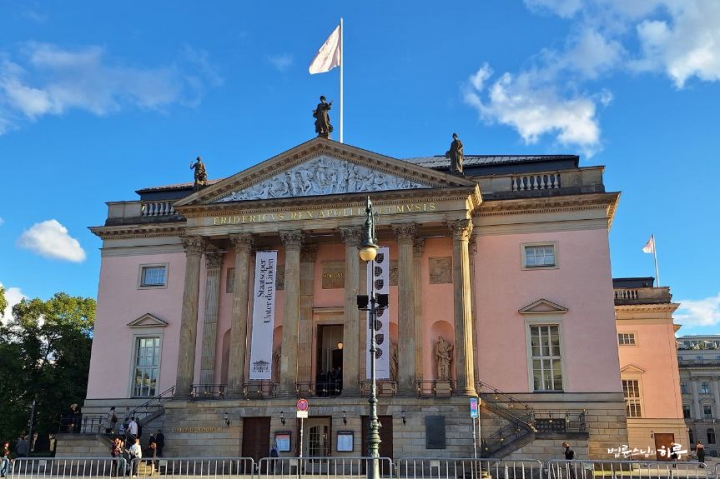
Today’s lecture is being held in Room 2097 at Humboldt University, located in the Mitte district of former East Berlin. This is a prestigious educational institution where countless world-renowned scholars, including Einstein and Hegel, have conducted research and lectures, and it continues to attract students from around the world today. The main building is located at Bebelplatz, which is also the tragic site where the Nazis burned countless books in 1933, making it a place that reminds us of academic freedom and responsibility. Sunim’s lecture today was held in this space rich with historical and academic significance.
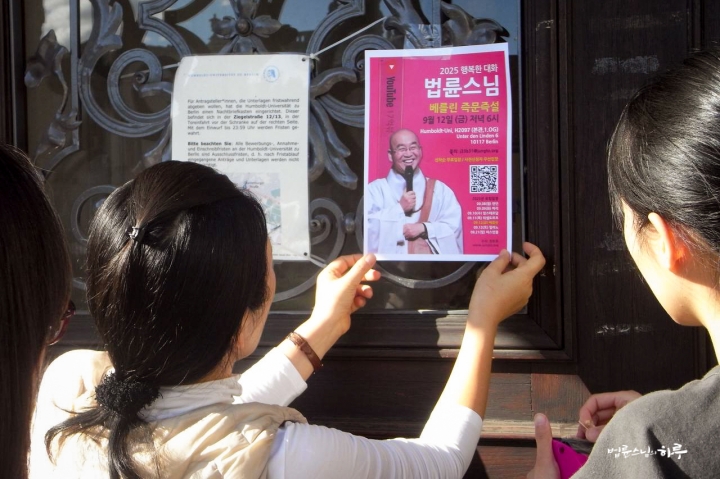
When Sunim arrived at the lecture hall, the volunteers preparing for the lecture warmly welcomed him.
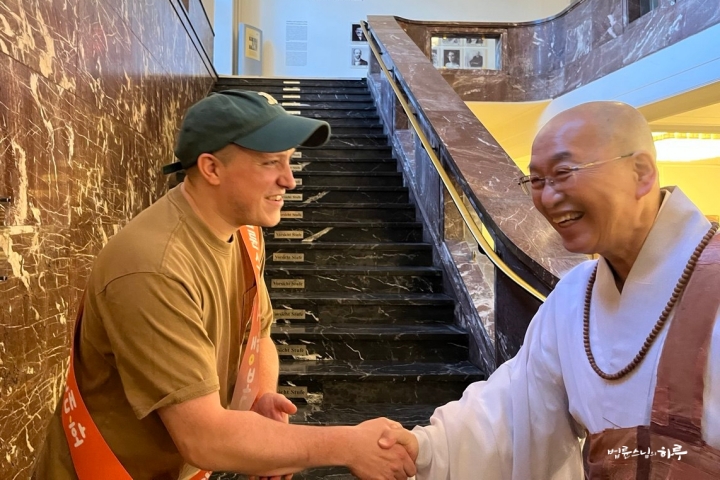
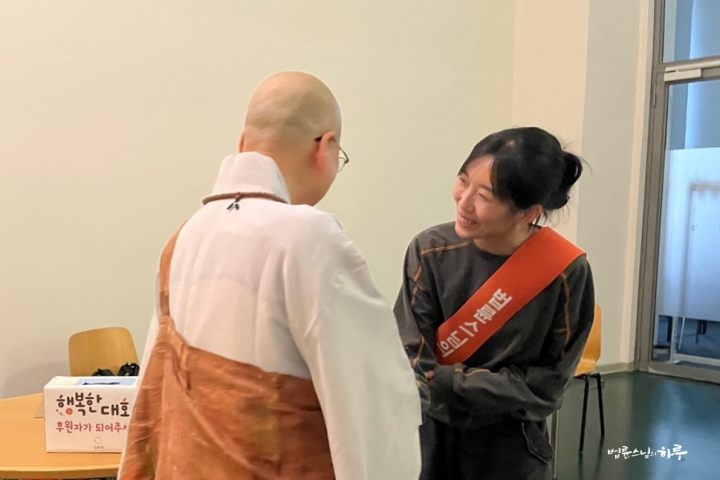
The seats prepared in the lecture hall were soon filled, and at exactly 6 PM, the lecture began with an introductory video about Sunim. As Sunim walked onto the stage with about 120 people in attendance, enthusiastic cheers and applause erupted.
First, Sunim greeted everyone with a smile.
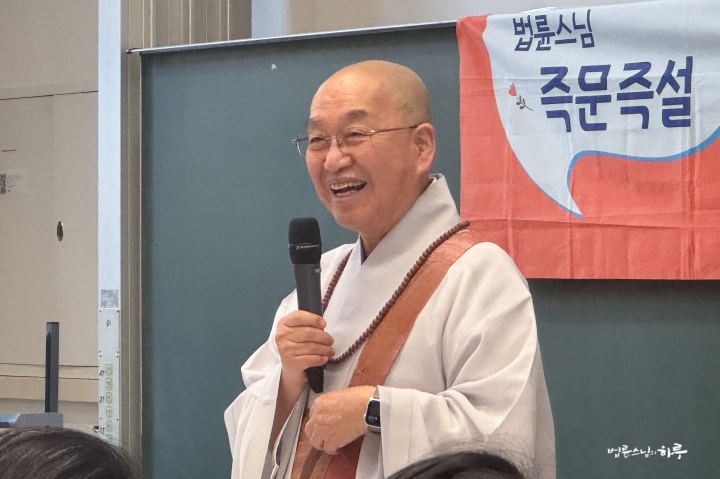
“If you’re curious about knowledge or technical matters, you can search on Google or ask AI. However, when it comes to life questions, there’s no obvious place to turn. That’s why today we’re going to have conversations about life issues that can’t easily be discussed elsewhere. I’m not here to give you the right answers, but rather to have a dialogue together. Through our conversation, questioners often realize on their own that ‘it’s not a big deal’ or ‘there’s no problem.’ Sometimes they come up with solutions like ‘I can solve it this way.’ In other words, no one is giving you the answer or method; you find your own path during the conversation. That’s why we call it ‘Dharma Q&A’ (immediate question, immediate teaching) rather than ‘immediate question, immediate answer.’ Now, let’s begin our dialogue.”
He then had conversations with those who had pre-registered their questions, followed by taking questions from the audience. Over two hours, seven people had dialogues with Sunim. One of them brought their daughter’s concern to ask Sunim.
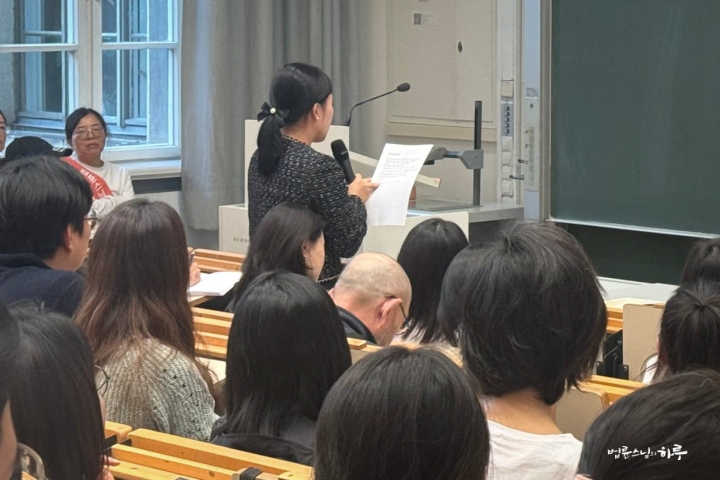
“I’ve brought a question that my daughter in her early 20s is curious about. ‘There’s something I absolutely have to do, but it’s too hard, I don’t want to do it, and I have no energy. What mindset should I have to do this work?'”
“If your daughter asked you that question, what would you tell her?”
“I think I would tell her that if she really wants to achieve her goal, she needs to overcome the difficulty, and if the goal isn’t important, she doesn’t have to do it.”
“Then you can tell your daughter just that.” (Laughter)
“I understand.”
“In Dharma Q&A, asking questions on behalf of others has no effect. This is because Dharma Q&A unfolds slightly differently depending on the questioner, the problem, and the situation at the moment. Also, asking on someone’s behalf assumes there’s a correct answer. Since Dharma Q&A isn’t about discussing life’s correct answers, you can’t ask questions on behalf of others. Did your daughter come to the venue with you? If she wants to ask directly, that would qualify as Dharma Q&A, so she can try that if she’d like. If she doesn’t want to ask directly, that’s fine too.”
Then the daughter sitting next to her took the microphone and asked Sunim directly.
When I Have to Do Something I Don’t Want to Do and Find Difficult, How Should I Approach It?
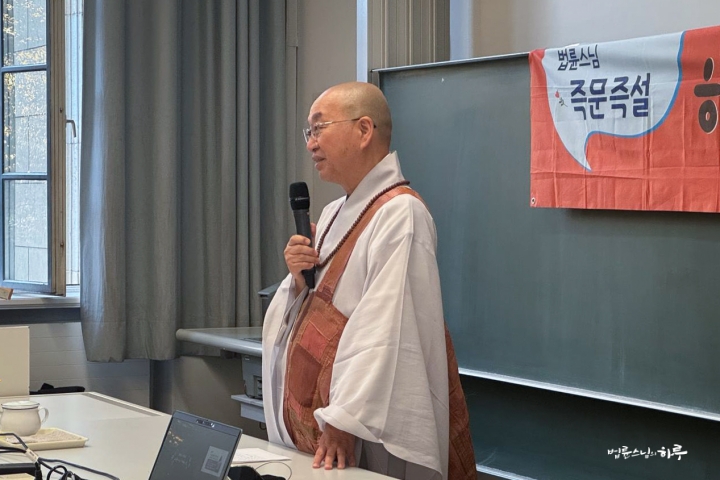
“There’s nothing in this world that absolutely has to be done. We just think there are things that must be done. If you don’t want to do it, don’t do it. If you want to do it, do it. However, even if it’s not absolutely necessary, if not doing it will cause harm, you might decide ‘I’d better do it even though I don’t want to.’ Conversely, even if you want to do something, if doing it will cause great harm, you might decide ‘I shouldn’t do it.’ For example, let’s say someone wanted to touch another person’s calf and impulsively did so, then went to prison as a sexual offender. Would that person be happy in prison thinking ‘At least I touched it’? Or would they regret it thinking ‘I should have controlled myself’? They would regret it because the harm is too great. The satisfaction from touching someone’s calf is far outweighed by the consequences. We call these consequences ‘karmic results.’ Right now you might want to touch the calf, but when you consider the future karmic results, the loss is too great, so you don’t do it. However, if someone says ‘Even if I go to prison, touching the calf once is more important to me. Going to prison is fine. This price is worth paying’ and they’re satisfied without regret, that too can be called a life without suffering. The ‘Way’ (道) is not only refraining from doing what you want in order to avoid consequences, but also willingly accepting those consequences.
Does this story seem impossible? It’s not. When Korean independence fighter An Jung-geun shot Ito Hirobumi, a Japanese stateman, and received a death sentence, he had no regrets. Rather, he willingly accepted death. People around him argued that he should hire a lawyer to properly appeal the immediate death sentence from the first trial, but An Jung-geun himself refused. He meant that since his actions were righteous, he needed no defense. His mother at the time reportedly said, ‘Since what you did was for the country, don’t beg for your life in an undignified way.’ There are plenty of examples of people willingly accepting the consequences of their actions.
Let’s say there’s food in front of you. Looking at it, the color is nice, the shape is good, and it looks delicious. But if someone next to you says the food is poisoned, would you eat it or not?”
“I wouldn’t eat it.”
“You want to eat it but since it’s poisoned, are you gritting your teeth and holding back, or does the desire to eat it completely disappear?”
“I think it would completely disappear.”
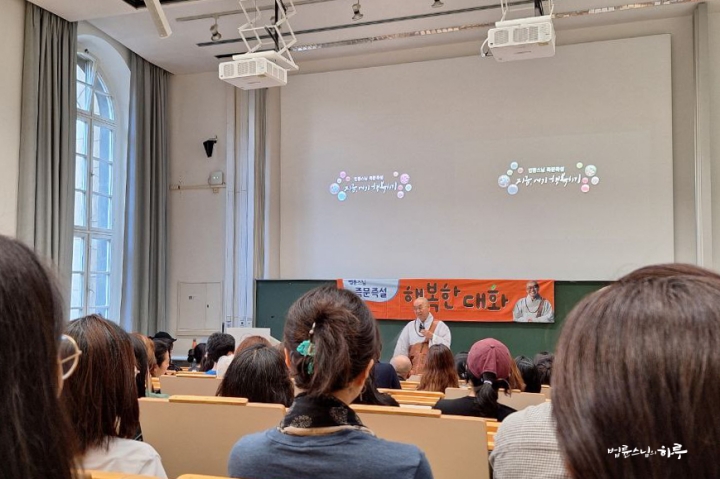
“That’s right. This isn’t about forcing yourself to resist through effort. When you learn that food is poisoned, no matter how appetizing it looks, the desire to eat it just disappears. But if someone keeps asking, ‘But I really want to eat it. I’m so hungry and it’s my favorite food. Can’t I just have a little?’ what would I say? ‘Fine, eat it and die.’ (Laughter)
If you think you’d rather eat it once and die, it’s okay to eat it. That’s also one path in life. You just said you wouldn’t eat it, right? No matter how much you want to eat something, once you know it’s poisoned, you don’t avoid eating it through effort – you just don’t eat it. If asked how you managed not to eat it, you’d just say you didn’t eat it. Similarly, even if you don’t want to do something, if not doing it causes enormous harm, you just do it. Even if you desperately want to do something, if doing it means going to prison, you just don’t do it. Asking ‘How can I not do it?’ like you did is actually like asking ‘Can’t I just eat a little?’ It comes from insufficient awareness of the harm. Once you understand the harm, the choice becomes simple.
A person who doesn’t do harmful things is wise, and a person who does harmful things isn’t bad but foolish. Conversely, if not doing something would cause enormous harm, you willingly do it. That ‘dislike’ isn’t so important. You do it even if you dislike it. If you ask ‘I don’t like it, so how can I do it?’ I’ll say ‘Then don’t do it.’ If you ask ‘I like it, so how can I not do it?’ I’ll say ‘Then do it.’ However, once you understand the following harm and benefit, you just do it without having to make a resolution.
Some people ask, ‘I have to get up in the morning to go to work but it’s hard to get up. How do I get up?’ If you don’t want to get up, you can sleep. Then you’ll be late and might lose your job. If you’re willing to accept that, sleep. If you don’t want to lose your job, you have to get up. Even if you don’t want to get up, when the alarm rings, you just jump up. But most people lie there thinking ‘I should get up, I should get up’ and keep making resolutions. That resolution is being made while lying down, not standing up. Once you get up, there’s no need to try thinking ‘I should get up!’ Saying ‘I should study, I should study’ also means you’re not studying right now. The essence is ‘I don’t want to.’ If you don’t want to get up, sleep and accept the karmic result of being late and facing consequences. If you don’t want to be fired from work, just get up. In Seon Buddhism, this is called ‘letting go.’ It means just putting down the clinging mind.
How do you get up? You just get up. There’s no need for effort in daily life. The term ‘effort’ is used when forcing yourself to do something you don’t want to do. When a child plays games because they enjoy it, we don’t say they’re ‘playing games diligently.’ People who like drugs don’t say they’re ‘doing drugs diligently.’ If it’s something that needs to be done, you should have the perspective of doing it willingly to avoid stress. But you all lie down constantly making resolutions and determinations, which causes tremendous stress. Because no matter how much you resolve and determine, you’re still lying down. Practitioners don’t make efforts. They don’t make determinations or resolutions. How do they do it?”
“Just!”
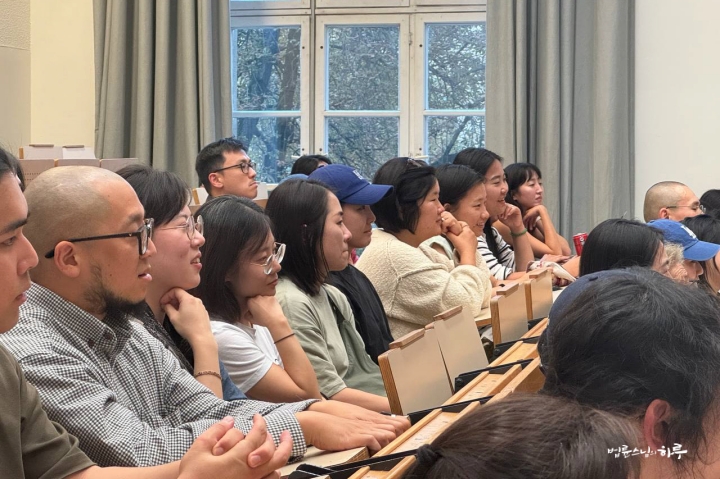
“If there’s work to be done, you just do it. Whether my mind likes it or dislikes it isn’t very important. You do it whether you like it or not. You neither like nor dislike. Do I always give lectures because I find it fun? Sometimes my body hurts so much that I don’t want to lecture. But when the scheduled time comes, I just give the lecture. Seeing this, people around me say that Venerable Pomnyun claims to be dying but comes alive as soon as he enters the Dharma assembly. They joke that even if I were about to die, if someone said ‘Sunim, it’s time for your Dharma talk,’ I would jump right up. If you’ve decided to do something anyway, it’s better to do your best. If you have a car accident and break your leg, you simply can’t do it. What you absolutely can’t do, you can’t do, and what you can do, you just do. The problem is when you don’t do what you can do. Suffering arises when you’re caught up in feelings of dislike.
If someone comes to me crying urgently asking to borrow a million won, suffering arises. If I lend it, I worry I won’t get it back; if I don’t, I worry about being cursed. But if some conglomerate chairman says his company is about to go bankrupt and asks to borrow 3 trillion won, no matter how desperately he speaks, no suffering arises. Because it’s something I can’t do anyway. Guilt arises when you can do something but don’t want to and so don’t do it. At such times, you need to think about the karmic results. If money is important, say you can’t lend it and accept being cursed. If you don’t want to be cursed, lend the money. Or even if they ask for ten million won, give them one million and tell them to just use it. But usually with close people, when you lend money, you don’t get it back properly and there’s a high chance of becoming enemies. So it’s better to just give a portion or not give at all and accept the cursing. If you say ‘I would have lent it if I had money, but this is all I have now, so just use this,’ you’ll actually receive thanks. You just lose one million won and receive thanks, but if you lend ten million trying to get interest, you won’t get the money back and will become enemies. Do you understand? What should you do with things you dislike from now on?”
“Just do them.”
“If you don’t want to do it, you don’t have to. But if not doing it causes great harm, just do it. If you don’t want to get up in the morning, don’t get up. But if not going today causes great harm, you must jump up. Just jump up. Saying ‘I should get up!’ means you don’t want to get up. Repeating ‘I should get up!’ ten times is like repeating ‘I don’t want to get up’ ten times, so the probability of not getting up is high. So don’t think ‘I should get up!’ – just get up. When the bell rings, don’t think, just jump up. Try practicing this once. If you couldn’t get up today, try jumping up tomorrow. Life isn’t worth making determinations or resolutions about. If you make determinations and resolutions, you’ll always be stressed. Just do it.”
“Thank you. I understand well.”
Questions continued to follow.
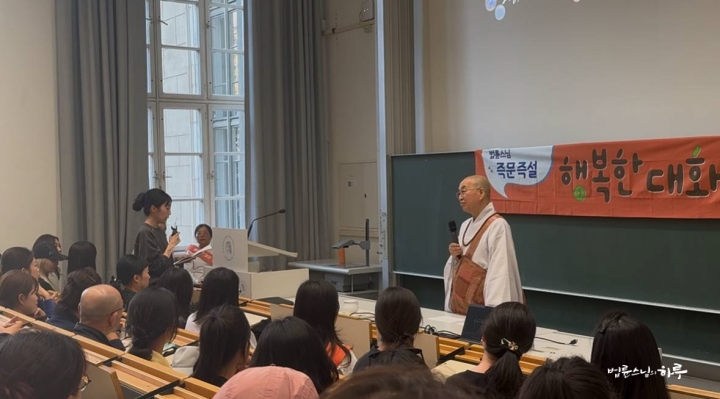
I worry a lot about unpredictable things. I’m curious whether the habit of constantly thinking about what might happen is a way to prevent future accidents or a way to amplify anxiety.
What does ‘moderation’ mean in life? Whether in relationships with people or when doing something, I only realize I overdid it after everything is over.
Even though I’ve achieved many things I wanted to achieve, I wonder ‘Is it okay for me to be this happy?’ What is my real happiness?
I want to study Buddhism with a fresh mind in a new place. What should I do?
When I meditate, I feel various emotions, but when I try to shake them off, I wonder ‘Isn’t it better for humans to have emotions?’ How do you meditate, Sunim?
Applause poured out each time someone’s face brightened.
The last questioner shared their struggle with a close friend, saying the relationship repeatedly went wrong and they felt used, finding human relationships very difficult.
When I Feel Like My Friend Is Using Me, What Should I Do?
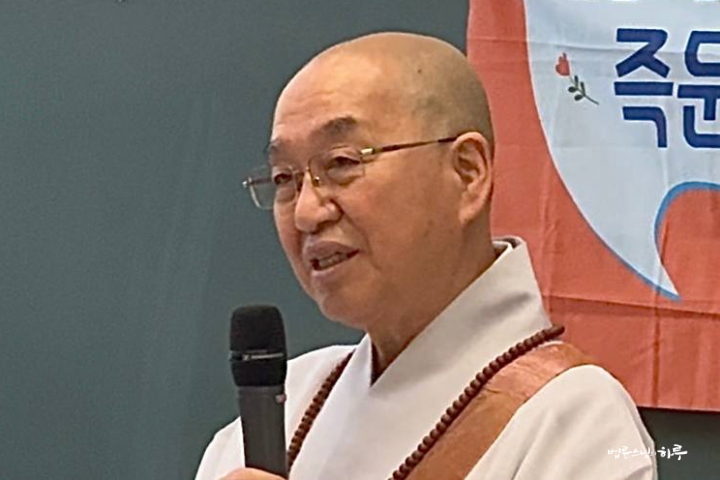
“After listening to you, I can see that you have a problem. What I mean is that you’re not making friends; you’re conducting relationships like business transactions. While calling them friends, you’re ultimately calculating gains and losses. Thinking ‘If I treat them a little better, my friend will betray me’ is ultimately a transactional perspective.
It’s fine if you recognize a transaction as a transaction. Strictly speaking, even the relationship between spouses is a transaction. When you choose a marriage partner, it’s the biggest transaction of all. You’re considering whether you can benefit from spending your life together. That’s why you look at their appearance, health, finances, and whether they’ll be devoted only to you. For example, when doing business together, you only look at one thing: ‘Do they have credibility or not?’ Their appearance or background doesn’t matter; only credibility counts. When making friends, people often look at just one thing: ‘Do they have loyalty or not?’ Like this, when forming relationships, we usually focus on one or two conditions. But when it comes to marriage, relationships become difficult because we try to secure ten or twenty conditions all in our favor. As you live, you might think, ‘I thought they had money, but they don’t,’ or ‘I thought they were trustworthy, but they’re not.’ But that doesn’t mean it’s wrong. That’s just how human relationships are.
Since humans are inherently selfish, it’s normal to approach relationships from a transactional perspective. When I chose my husband or wife from a selfish viewpoint, I need to understand that they also chose me the same way. There’s no need to call the other person selfish. It’s like making a transaction at a store. What should you do if you keep incurring losses? You can end the business relationship. This isn’t wrong. Similarly, whether you get married or divorced, it’s not a big mistake. From a business perspective, it’s not a major problem. The problem arises when we mistake this for ‘love.’ If someone is truly a friend, shouldn’t I be a bit forgiving even if they cause me some loss? And shouldn’t that friend also benefit a little from meeting me? If I curse back just because my friend cursed at me, what kind of friendship is that?
In ordinary relationships, we can usually act that way. But if they’re a real friend, I shouldn’t curse even if they curse at me. That’s because they’re my friend. Even if a friend causes me loss, I shouldn’t cause them loss, and even if a friend breaks a promise, I should be able to wait for them. In ordinary relationships, if you curse, I can curse back, and if you cause me loss, I can cause you loss too. But we can only use the word ‘friend’ when we transcend such relationships.
In the end, you haven’t made friends; you’ve just made transactions. When you made transactions, you kept incurring losses. It’s like doing business poorly. The reason you did business poorly is that you misjudged, thinking ‘This will benefit me.’ I’m not saying we shouldn’t make transactions in human relationships. Fundamentally, all human relationships are transactions. If we meet with this transaction as a premise, we can develop much better relationships and won’t hate others even when they seek their own benefit.
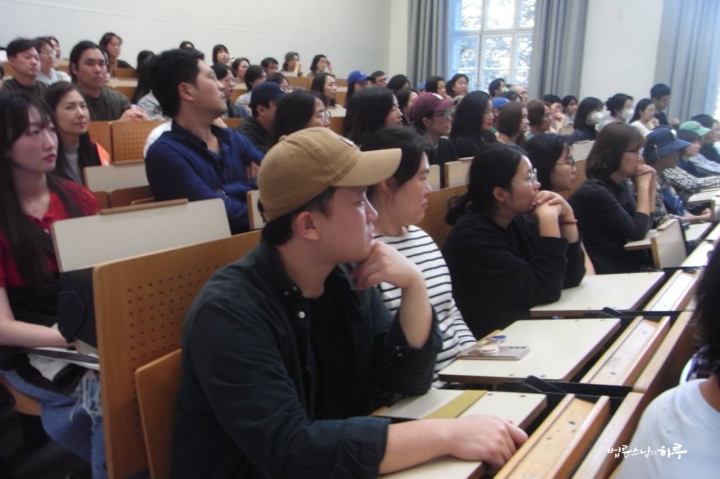
When you meet various people, there are those who help you mentally even if you suffer some economic loss. Conversely, there are those who help you economically even though they’re mentally exhausting. People marry into wealthy families even if they don’t like their partner’s appearance or if they have some disability. Such transactions work because people value different criteria. It’s not just about economic conditions. Transactions can work when conditions match, like ‘I can help you economically a bit, but please take good care of me in return!’
When you say ‘I need to get up…’, it doesn’t mean you want to get up but can’t. Saying you need to get up is the same as saying you don’t want to get up. Relationships are the same. When looking at our relationships, we should see them as transactions if they’re transactions, as friendship if they’re friendship, and as love if they’re love. For example, let’s say I truly love someone. But one day I see my girlfriend walking hand in hand with another man. If I truly love her, I should ask why. ‘I saw you holding hands with this man, what happened? Was he a school friend? An old boyfriend?’ I need to verify like this. If I’m lacking in some area, I should fulfill that for my partner. But while claiming to love, emotions get intense and we can’t assess the situation rationally. This is desire, not love. It’s more accurate to call it attachment.
We need to know afflictions as afflictions, transactions as transactions, and benefits as benefits. The Buddha’s teaching isn’t about ‘Live your life this way!’ The Buddha’s teaching is about knowing facts as they are. If you’ve fallen, know that you’ve fallen; if you’re standing, know that you’re standing. It doesn’t teach that you shouldn’t fall. For example, when you’re about to eat poisoned food, the Buddha just informs you, ‘There’s poison in that.’ He doesn’t interfere by saying don’t eat it because it’s poisoned. He merely informs you of the fact that it contains poison; whether to eat it or not is your decision. But over time, as the emphasis became ‘Don’t eat it because it’s poisoned!’ and the teaching was transmitted as ‘Don’t do it!’, Buddhism, which teaches truth, became like ethics.
Buddhism, which speaks truth, merely informs you of the fact that ‘it contains poison’; it doesn’t force you not to do something. Whether to eat or not is each person’s choice. If you want to live, you won’t eat it; if you really want to eat it, you might eat it and die. Buddhism doesn’t say which life is better. That’s because what kind of life to live is an individual choice. However, every choice comes with responsibility. Buddhism merely tells the truth. When people try to eat food to survive, it tells them the truth so they won’t regret not knowing if it contains poison. What to do based on that is their life.”
“Thank you. I understand well.”
Although there were more people who wanted to ask questions, they had to wait for the next opportunity.
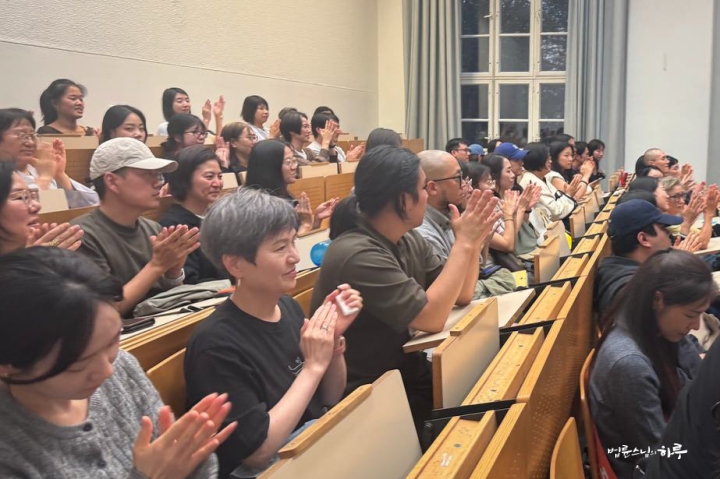
Since sales are prohibited at the university, the lecture ended without a book signing event. After all the audience members left the lecture hall, Sunim took a commemorative photo with the volunteers who had prepared the lecture.
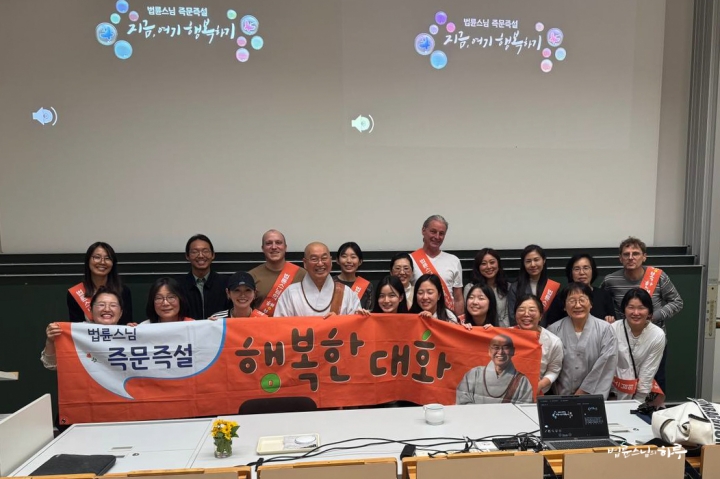
The volunteers had a mindful sharing session with Dharma Teacher Myodeok.
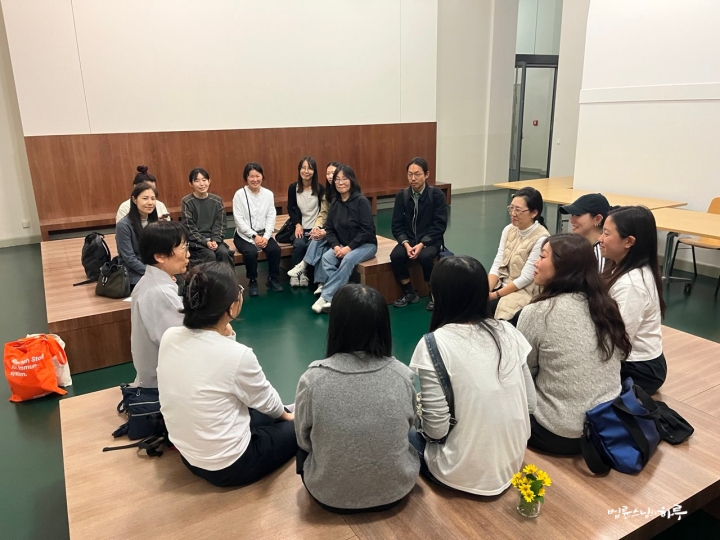
“This was the first volunteer work I did because I wanted to. While preparing for the lecture, I met good friends and heard Sunim’s wonderful teachings. I’m happy that I seemed to be helpful.”
“I was in charge of external guidance for this lecture, which was a completely different role from what I had done before, so I was a bit worried. But when I actually did it, it became an experience of discovering myself through this new role.”
“I approached my volunteer work while practicing letting go, recognizing my desire to do well and acknowledging it as my own desire. It was a time when I could feel that volunteering is practice itself.”
Although they took on different roles, they shared joy while experiencing learning and reflection in their respective positions. In the warm atmosphere that filled the lecture hall, it became a precious time for both volunteers and audience members to grow together.
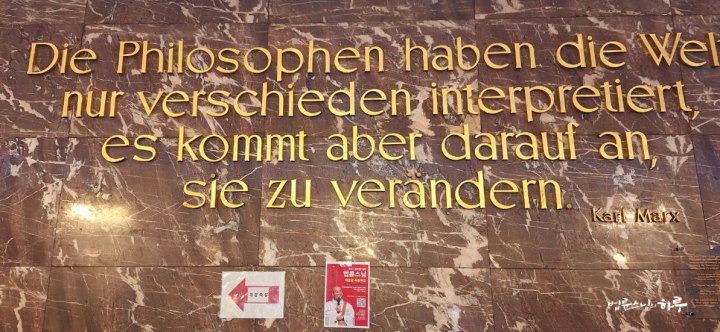
After expressing his gratitude to the volunteers, Sunim headed to his accommodation. He had a late dinner at the accommodation at 8:20 PM and ended his day’s activities early.
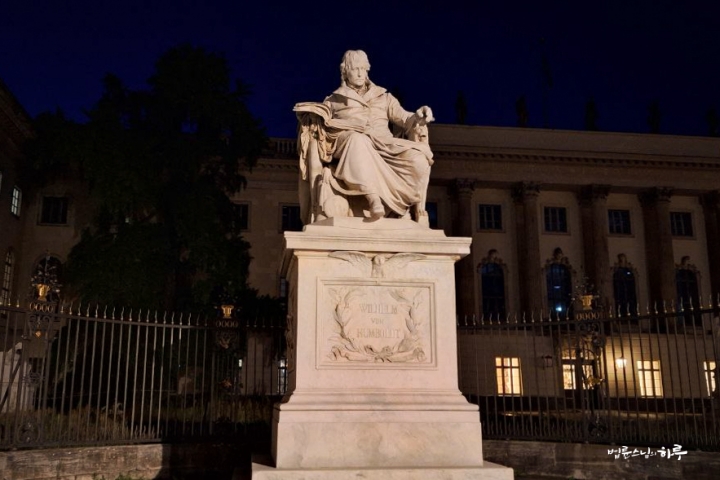
Tomorrow, he will conduct a live broadcast for the Jungto Sutra Course entrance ceremony at 3 AM, then depart from Berlin Airport in the morning to fly to Milan Airport in Italy. In the afternoon, he will give a Dharma Q&A lecture for local Korean residents in Milan as the sixth stop of his European lecture tour.





